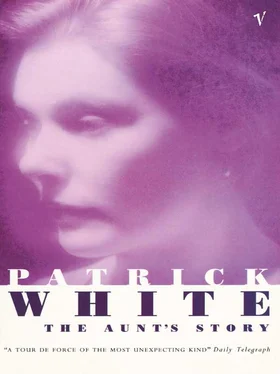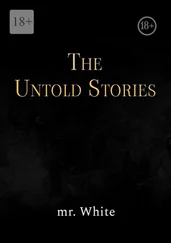Father once said to Mother that Fanny would always ask the questions that have answers.
And Mother was annoyed and said, ‘Turn your toes out, Theodora. And run and do your hair. You look a fright.’
It was not surprising.
Theodora Goodman was altogether unsurprised. On her twelfth birthday the big oak in front was struck by lightning, and from three hundred yards Theodora was thrown to the ground. Gertie said it was an act of God. But Theodora picked herself up, out of the event, it was one of the things that happened, and which it was still not possible to explain, like Pearl Brawne, and Mother’s moods, and the Syrian. So Theodora picked herself up and gave a rather pale laugh, because naturally she had been frightened, and went to look at a calf that had just been born.
It was this same day too, the day of the lightning, that a man came who had been Father’s friend once, when Father had been prospecting, it seems. The man was sitting on the veranda, late in the morning, when Theodora walked round.
‘I came to see your father,’ the man said.
He had a beard, like a prophet, greyer than Father’s, thick and big.
‘Did you?’ said Theodora.
‘Yes,’ said the man. ‘You had a bit of a storm. That’s a bad bit of business.’
He pointed to the tree.
‘That is an act of God,’ said Theodora. ‘I was three hundred yards away, but I survived.’
‘It is sometimes like that,’ the man said.
And now Theodora decided to sit down, because something warm and close had been established with the man.
‘Perhaps they will ask you to stay to dinner,’ she mused, almost as if she did not belong.
‘I dunno,’ said the man. ‘Sometimes it’s different when they settle down.’
He sounded melancholy. And suddenly the lightning trembled in Theodora, that she had not felt, the lightning that had struck the oak.
‘What’s up?’ the man asked.
‘Nothing,’ said Theodora.
But she continued to tremble.
‘Or if they don’t give you dinner, perhaps they will give you some money.’
‘You know a thing or two,’ the man said.
‘I know very little,’ Theodora replied.
She looked at the man who had come to see Father and knew that he must know a great deal.
‘What do you do?’ she asked.
‘I look for gold.’
‘Why?’
‘Because,’ he said, ‘it is as good a way of passing your life as any other.’
This sounded funny. It made the walls dissolve, the stone walls of Meroã, as flat as water, so that the people sitting inside were now exposed, treadling a sewing machine, baking a loaf, or adding up accounts. But the man walked on the dissolved walls, and his beard blew.
‘You must be rich,’ said Theodora.
‘Why?’ asked the man.
Now, in fact, it was his turn.
‘Well,’ she said, ‘looking for gold.’
‘But I haven’t found very much.’
She would have pitied him, but his eyes, she saw, were pleased. The man laughed. Altogether he was unlike the other people who came to the house, or anyone in the house, except a little like Father.
‘You are poor then?’ she said, looking curiously at the fact, to which the man’s laughter gave a beautiful clarity.
‘That’s the obvious deduction,’ he said.
Behind them they could hear the safe sounds of the house.
‘Poor,’ said the man, ‘and hoping that your Father, for sentimental reasons, will tell them to dish me up some dinner. My belly’s hollow,’ he added. ‘And you Father’s taking a hell of a time.’
Theodora went inside to see what was happening, and the man continued to sit and kick his rather worn heels.
‘You are a romantic, George,’ Mother was saying. ‘Romantic and ridiculous , they both begin with r.’
‘It’s a pity,’ said Father in a tight way, ‘that you never realized this before.’
‘As if I didn’t,’ said Mother. ‘As if I didn’t! I very quickly learned to spell. But, of course, I am tarred a little with the same brush.’
Then she looked at him and laughed, as if it were the least funny thing that had ever happened.
‘Julia,’ Father said quickly.
He could not quite find what it was he wanted to say. He took a step forward. You felt that he would have gone farther if it had been anyone else but Mother.
Mother sat on the sofa. She twisted her rings round. She rolled her hands in a tight ball and said, ‘It is no use, George. I refuse to sit down to table with every tramp that comes along. I will not. I will not.’
Then you knew that Mother had won, in spite of Father breathing hard. It was terrible, the strength of Mother. All your own weakness came flowing back. Mother was more terrible than lightning that had struck the tree.
‘But we can give him his dinner,’ Theodora dared. ‘We can give it him on the closed veranda. Round the side. Gertie can hand it through the window of the spare room.’
Short of turning her face, to avoid what she could not avoid, what she had just seen, she had to say something, and she said this.
‘Oh, it’s you,’ said Mother sharply. ‘I did not see you were there. Yes,’ she said, ‘Theodora seems to have solved the problem. Let him have it on the closed veranda. Round the side.’
‘Let Gertie hand it through the spare-room window. To the leper,’ Father said.
Then he left the room.
But the man who came was given his dinner.
‘You eat an awful lot,’ said Fanny.
‘Because my belly’s empty,’ the man said, as he continued to put into his mouth boiled beef, dumplings, carrots, cabbage, squares of bread, and draughts of tea.
‘I’m hungry,’ he said. ‘And I like eating.’
‘I like meringues best,’ said Fanny.
‘And you?’ said the man to Theodora.
‘I don’t know,’ she said.
Under cover of the conversation between Fanny and the Man who was Given his Dinner, Theodora had withdrawn, and now she felt shy. She would have preferred the man’s silence, or else the cracking of his jaws as he chewed and swallowed the boiled beef. She could not see him eat too much, because his act covered their shame.
‘You’re more like your father,’ the man said to her. ‘More like your father used to be. We was mates. We went prospecting down Kiandra way. I remember once we got lost, one Easter, in the mountains, when the snow came. There was the ghost of a man in the mountains, they said, who got lost in a snowdrift driving his sheep. We sat all night, your father and I, under the shelter of a big dead tree, listening to the dingoes howl, waiting for the ghost. Cripes, it was cold up there. We had a fire each side. But it was cold. We sat with our arms round each other, and then your father fell asleep.’
‘Did you see the ghost? Did you? I would hate to,’ Fanny said.
But the man said, after a little, after he felt like speaking again, ‘Why, no, I didn’t see the ghost. And in the morning your father woke up, and we laughed. The sun was up, and we was sitting on the edge of the blasted track.’
The Man who was Given his Dinner laughed now. He brushed his beard with the back of his hand. Sun fell through the shaggy tree, and things were good to touch.
‘I could tell you a lot of things,’ said the man.
He said it, Theodora knew, to her, in spite of Fanny, and Gertie Stepper, who stood at the spare-room window holding the crumbs.
‘Why don’t you stay and tell us?’ asked Fanny.
But looking at Theodora, the man’s mouth opened and closed, as if it was mouthing a great potato. Then at last it closed on words. ‘I got to be making tracks,’ he said.
He put on his felt hat, which had blackened round the crown with sweat.
‘You’ll be wanting to thank the boss and the missus, said Gertie Stepper out of the window.
Читать дальше












